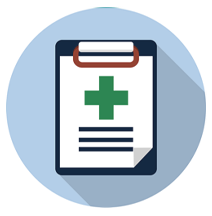We are Data Analytic Specialists
Analyte Logic offers full clinical data management including EDC, Biostatistics, Statistical Programming and Medical Writing services to the life science industry. Our services spansacross all phases of clinical trials in all therapeutic areas including medical devices and registry studies.Electronic Case Report Form (eCRF)
Our database designer prepares eCRFs as per the study protocol, CDASH standards and/or sponsor specific requirements. Each set of eCRFs passes through full User Acceptance Testing (UAT) and Computer System Validation (CSV) steps before moving into the production environment. A CRF completion manual (or Data entry Guidelines) is provided to the site personnel to promote accurate data entry. Analyte Logic maintains a library of eCRF modules to provide rapid turnover cost-effective study design solutions.
Analyte Logic's Electronic uses 21 CRF part 11 compliant EDC systems for the clinical trials.
Average time of eCRF (first draft) development for a Phase I study is 5 Business days.
Average time of eCRF (first draft) development for a Phase II or III or IV study is 10- 15 Business days.
Average time of eCRF (first draft) development for Registry and other types of studies is 5 - 10 Business days.
Clinical Data Management Documents
Our Lead Clinical Data Manager prepares a detailed Data Management Plan (DMP) to outline the CDM activities to be followed throughout your study. The DMP describes the database design, data entry and data tracking guidelines, quality control measures, SAS reconciliation guidelines, discrepancy management, data transfer/extraction and database locking guidelines. Along with the DMP, a Data Validation Plan (DVP) containing all edit-checks to be performed and calculations for derived variables are also prepared. Edit checks help in cleaning up the data by identifying the discrepancies. At minimum for any give study, the following documents are prepared:-
- Data Management Plan (DMP)
- Data Validation Plan (DVP)
- Serious Adverse Event reconciliation Plan (SAE R Plan)
- Data Transfer Plan
Additional documents can be prepared as per study specific requirements or as per the sponsor.
Data Handling
At minimum, the following services are provided:-
- Data Entry
- Data Validation
- Discrepancy Management
- Medical Coding
- Serious Adverse Event Reconciliation
- Database Lock/Freeze
SAS Programming
Our experienced programmers provide SAS solutions for phase I – IV and registry studies. We use our in-house macro facility and validated SAS codes to generate outputs to meet the requirements of your clinical study reports and submission ready datasets.
- Tables and Listings preparation
- CDISC Submission Package
- SDTM (Study Data Tabulation Model)
- ADaM (Analysis Dataset Model)
- Define files
- Blank and Annotated eCRF
- Patient Profiles
- Legacy datasets conversion to CDISC data standards
Biostatistics
Analyte Logic Inc. offers leading statistical analysis and reporting services through the use of industry preferred software i..e, SAS®. These programs ensure the integrity of your data, organize results in a clear and compelling presentation, and provide the analysis in a timeframe that meets or exceeds your expectations.
The biostatistics team offers the following services:
- Sample size planning, power calculation and randomization
- Regulatory and advisory meeting support
- Statistical analysis plans
- Statistical analysis and support services for interim, futility, and DMC analyses
- Integrated summaries of safety and efficacy
- Preparation of case report tabulations (CRTs)
- Quantitative epidemiology including patient registries
Medical Writing
Our Medical Writers work closely with our colleagues in the biostatistical, pharmacovigilance, project management, and clinical data management teams to deliver accurate, timely, and cost effective documents to the highest ethical and scientific standards.
Our services include:
- ICH GCP compliant Clinical Study Reports (CSRs); Phases I to IV, including CSR Synopses for public disclosure
- Study Protocols
- Clinical and non-clinical sections of the Common Technical Document (CTD) including summaries and overviews for EU and US Regulatory Authorities
- Investigator Brochures
- Patient Safety Narratives
- Patient information including Informed Consent and Patient Brochures
- Pharmacovigilance documents such as Periodic Safety Update Reports
- Standard Operating Procedures (SOPs) covering all aspects of drug development including the design, conduct and reporting of clinical trials and the outsourcing of Sponsor responsibilities to a Clinical Research Organization (CRO)








